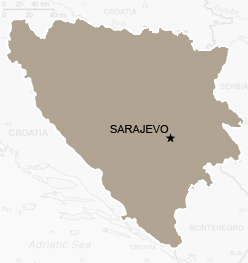

Bosnia and Herzegovina
Eastern Europe
Bosnia and Herzegovina
Capital Sarajevo
Population 4.6 million
Life Expectancy 78.5
Access to clean water n/a
Adult literacy 96.7%
Under five mortality 9.1 per 1,000 live births
GDP per head (US$ PPP) $6,500

 This evaluation is a knowledge-generating exercise whose goal is to: 1) Assess the MDG-F's contribution, at national level, to the achievement of the MDGs, the principles of the Paris Declaration and the UN reform initiative to “Deliver as One”; 2) Identify best practices and lessons learned in order to inform future joint programming for development; and 3) Connect local level programme interventions with national level policy-making processes by highlighting successful pilot initiatives with the potential for replication and scale-up.
This evaluation is a knowledge-generating exercise whose goal is to: 1) Assess the MDG-F's contribution, at national level, to the achievement of the MDGs, the principles of the Paris Declaration and the UN reform initiative to “Deliver as One”; 2) Identify best practices and lessons learned in order to inform future joint programming for development; and 3) Connect local level programme interventions with national level policy-making processes by highlighting successful pilot initiatives with the potential for replication and scale-up.
Bosnia Herzegovina_Country Final Evaluation.pdf (7.54 MB)-
Country Fact Sheet
 This Fact Sheet summarizes the key achievements of the Joint Programmes in Bosnia & Herzegovina.
This Fact Sheet summarizes the key achievements of the Joint Programmes in Bosnia & Herzegovina.
Bosnia & Herzegovina Joint Programmes Fact Sheet.pdf (165 KB)
MDG-F Case Study Evaluation
Our Joint Programmes
Securing Access to Water through Institutional Development and Infrastructure Access to safe drinking water in BiH is well below European standards. Water supply and quality is only adequate in large urban centers; in many smaller cities and rural areas, residents have to pay high prices for water delivered with tankers by private vendors. The Joint Programme's objective was to secure access to safe water for all citizens in Bosnia and Herzegovina by strengthening government capacity, increasing investments in the water supply sector and including poor populations in water planning and policy. Mainstreaming environmental governance: linking local and national action in Bosnia and Herzegovina Bosnia and Herzegovina has made significant strides in economic stabilisation and national cohesion in the two decades since the break-up of the former Yugoslavia. However, the environment sector is critically stagnant: there is a lack of environmental policy and legislation, poorly developed management and implementation capacities, little public participation in environmental decision-making and a lack of reliable information and data. The Joint Programme's goal was to boost local management of environmental resources and service delivery by improving environmental governance and developing replicable models for environmental planning. BiH Youth Employability and Retention Programme The employment situation for young people in Bosnia Herzegovina is challenging. The country is still marked by the residual tensions of war, political dynamics between levels of government are complex, policy implementation inefficient, and the transition economy is operating at below potential. In 2012, 60% of the country's young people were jobless. The Joint Programme worked closely with Government, the private sector and civil society to improve the employability of BiH youth and provide new entry points to the labour market. Improving Cultural Understanding in Bosnia and Herzegovina Two decades after the end of the Balkan wars, Bosnia and Herzegovina remains a fragmented society, with divisions along ethnic lines keenly felt, particularly in the school system. The Joint Programme was designed to strengthen the sectors of culture and education as a way to promote sustainable development and an intercultural and tolerant society.IN THE NEWS
Reconstruction of three religious monuments - symbols of multiculturalism supported by MDGF Culture and Development Programme
Memorandum of Understanding for support of rehabilitation of three valuable cultural heritage sites of Bosnia and Herzegovina: Ferhadija Mosque of Banja Luka, the Orthodox Cathedral of Mostar and Franciscan Monastery of Plehanas, has been signed by Yuri Afanasiev, UN resident Coordinator, highest representatives of BiH, entity and religious institutions.







